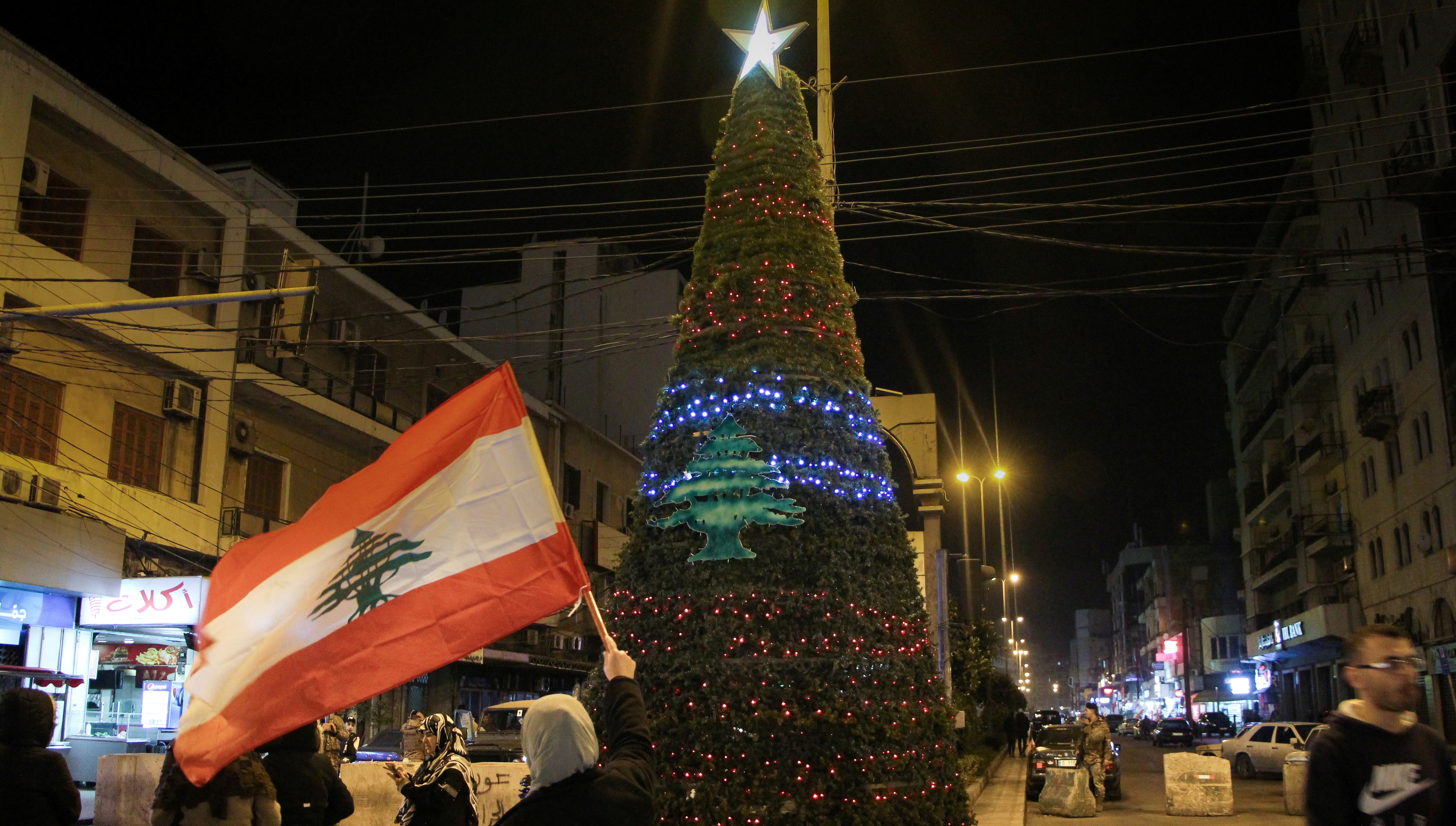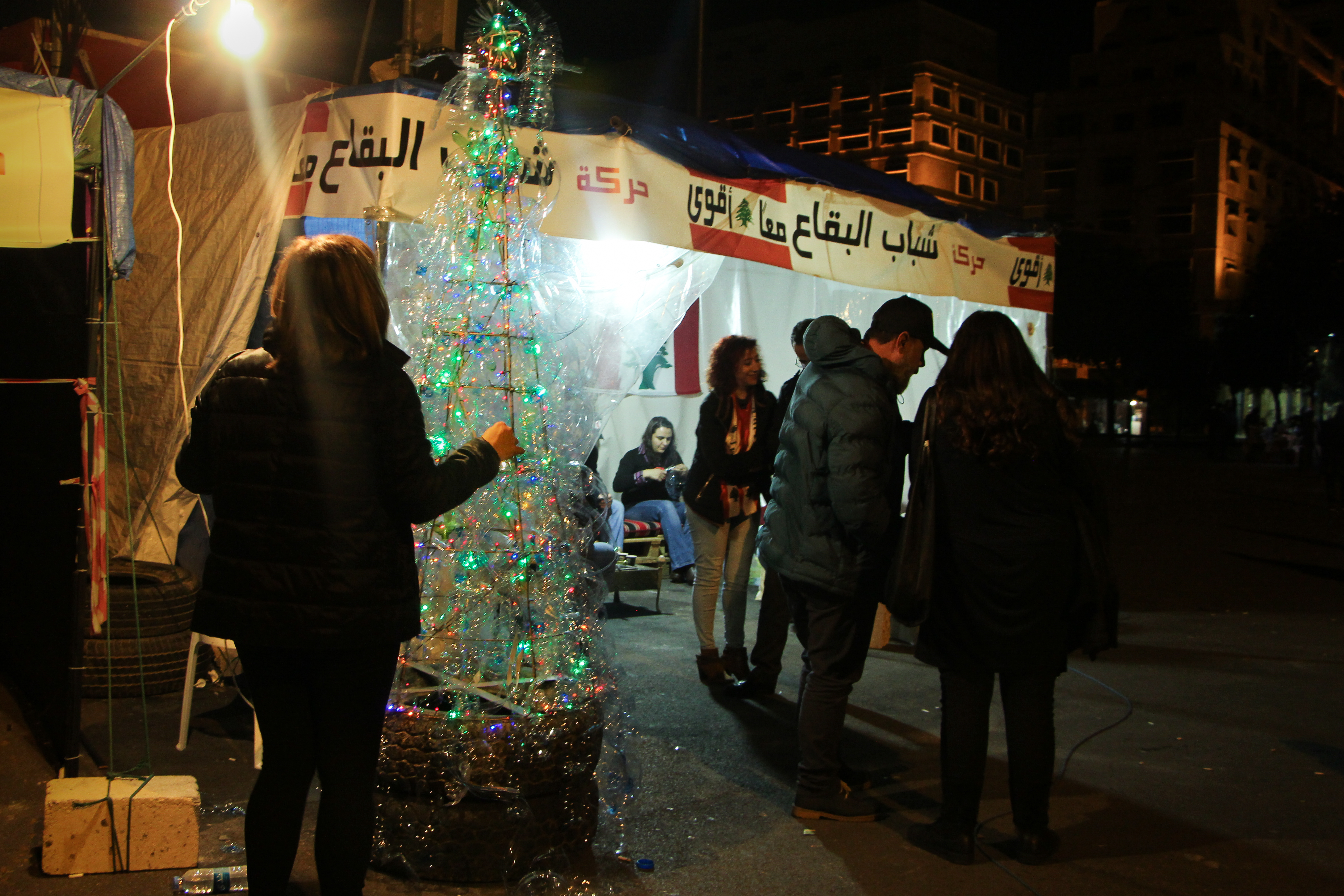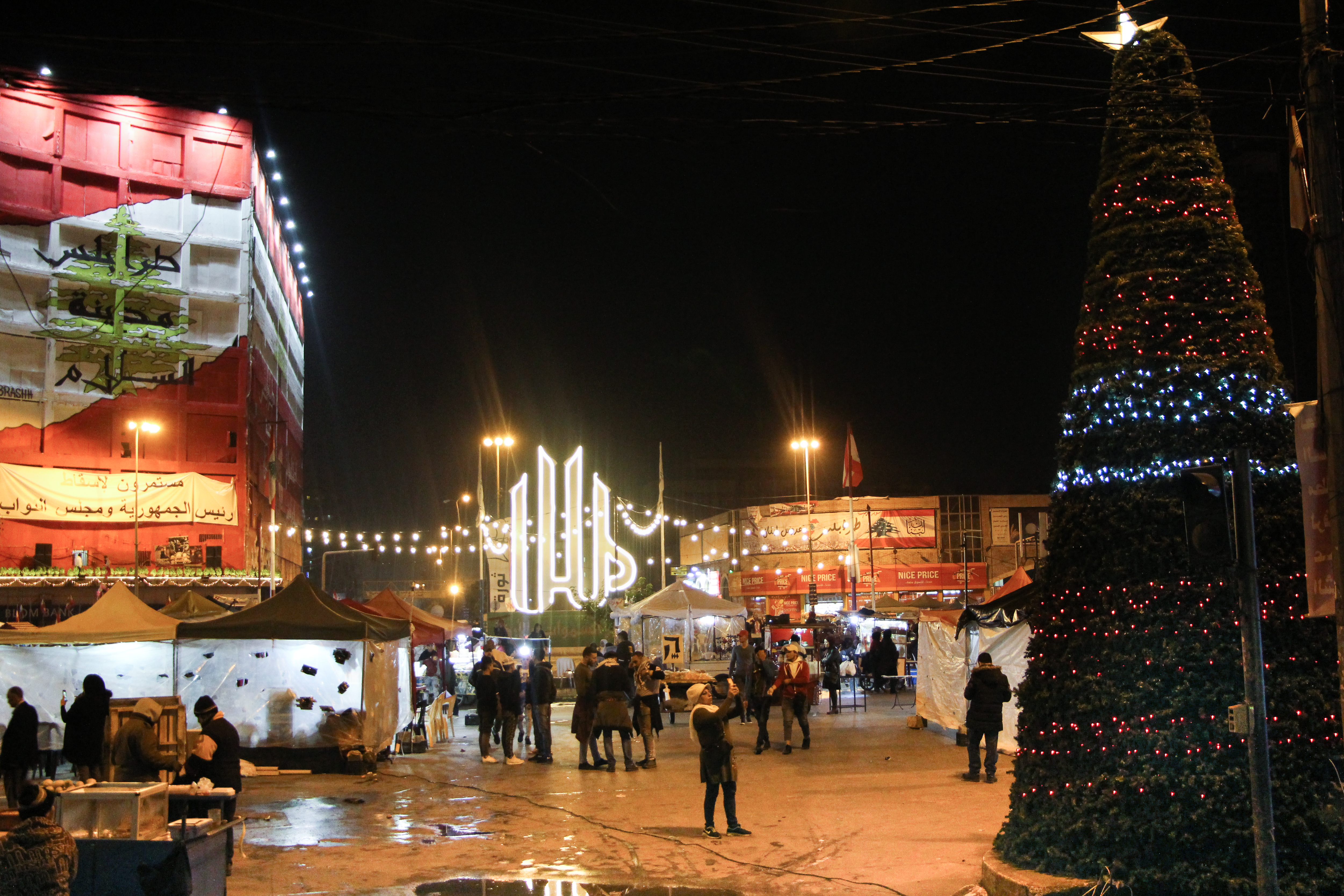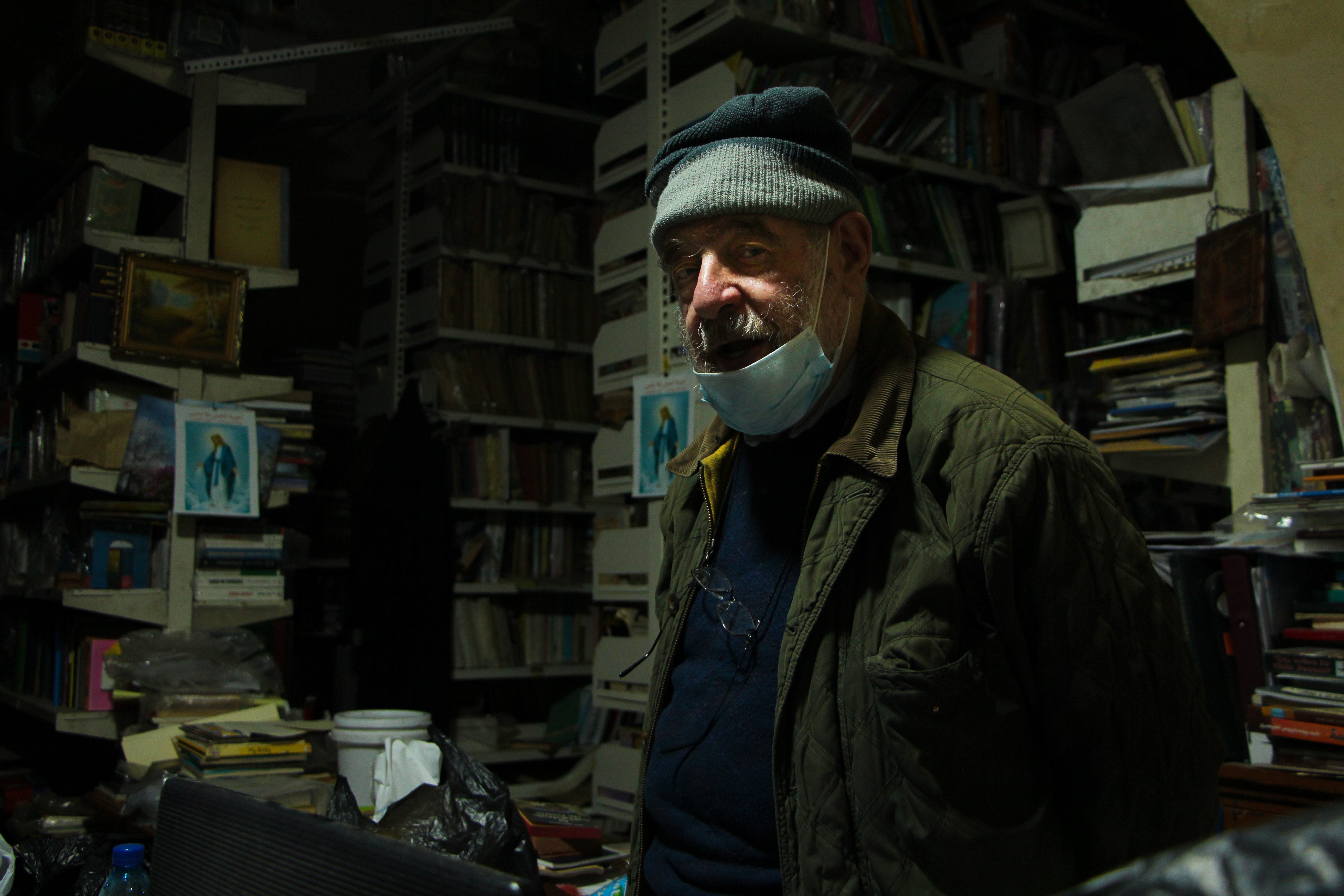Revolution under the Christmas tree

Year in, year out, fairy lights, plastic reindeers and Christmas trees are par for the course right across the Lebanese capital – in Christian, Shia and Druze districts alike. After all, as many people here say, Jesus is not just for Christians. This year, however, Christmas in Beirut has lost its lustre. People have other things on their minds. The ever-worsening economic situation has dampened the party atmosphere that so dominated the protests in October and November.
While shops in the city have – like every year – stocked up on mountains of baubles, tinsel, plastic Christmas trees and Santas in all shapes and sizes, sales are sluggish. "This year, we are forcing ourselves to get into the mood for Christmas," says an elderly passer-by.
Even the sparse decorations in the streets seem half-hearted. One couple who are perusing Christmas articles in a shop in downtown Beirut says: "This is the first time that things have been so un-Christmassy in Lebanon. And even if we are looking forward to it, we feel guilty because others have lost everything in the economic crisis."
Christmas on a shoestring
Despite all this, a first small Christmas tree was erected on Martyr Square in Beirut just a few days ago. It's a home-made tree, made out of cut-up plastic bottles. "It's the best we could do given the economic situation," says a woman as she hangs another plastic spiral on the tree.

The Christmas tree on Sahat an-Nour, the main square in Tripoli, on the other hand, looks magnificent. It is not right in the middle of the square, but it is decorated in the colours of the Lebanese flag: red and white with a green cedar. If you ask any Tripoli residents present what the tree stands for, they will say that it stands above all for mutual respect, regardless of religious denomination. Most demonstrators donated a little so that the tree could be purchased. It was decorated by Muslim women – a spur of the moment development.
This is the first time that a Christmas tree has been erected on the main square of what is a predominantly Sunni city. Inspired by the thawra, however, the people have "broken down the barriers of fear between them and the ruling elite," explains Abdel Rahman, a demonstrator in his early twenties.
A Christmas tree on Sahat an-Nour standing alongside the big, brightly illuminated word "Allah" right in the middle of the roundabout would have been unthinkable this time last year. People were too afraid that the Christmas tree would have been considered heresy in the eyes of the Sunni religion. Says Abdel Rahman: "But Allah is not just for Muslims; he is for Christians too and for everyone."
Sahat an-Nour: hub of the revolution
Up until recently, Tripoli had a very poor reputation. In the national and international press alike, Tripoli was renowned for inter-denominational conflict and extremism. For this reason, many people in Beirut have never set foot in the country's second largest city. But since 17 October of this year, the day on which protests began, Tripoli has been in the headlines for all the right reasons.
More than anything else, it was a 30-second video that showed the world a very different side to the city. On the third night of anti-government mass protests in October, Sahat an-Nour was transformed into a rave: a DJ on the balcony of a ruined building played and the demonstrators danced. The video went viral. Tripoli quickly became the heart of the revolution, a symbol of the rage directed at the policies of the Hariri government, which had long been able to rely on the support and the votes of the people of Tripoli.

Usually a very busy intersection, the square is currently closed to traffic. The buildings around it have been painted in the colours of the Lebanese flag. At the same time, Tripoli has proven to be the most peaceful protest city in Lebanon in recent weeks, even though no people in Lebanon suffer more as a result of government policies and the prevailing economic situation than the people in Tripoli. "We have nothing to lose. We have no hospitals, no money, no jobs, no state," says Abdel Rahman.
We are all Lebanese
"Jesus is a prophet; he is very important for us Muslims. If you are a Muslim and don't believe in Jesus, then you are not a Muslim. We love the Christmas tree," says Najah, a young demonstrator, before striking up a protest song arm in arm with other protestors: "Where do you come from?" they sing; "I'm from here," comes the reply. And that's what most of the protests are all about: people no longer want to be pigeonholed.
"If I say that I am from Tripoli, people automatically assume that I support Hariri and am a Sunni. Someone from the south of Lebanon is immediately assumed to be in the Shia Hezbollah camp. It's got to stop. Before the revolution, we were Sunni, Shia, Christians, or belonged to a certain party. Now we are one. We are all from here."
Ask the group of young people with Abdel Rahman and Najah what they hope for and they reply, "the end of corruption and a secular state." As far as they are concerned, the sheikhs and religious leaders are sowing discord (fitna).
Religion as a camouflage for their power games
Sheikh Mohammad Shaaban, prayer leader in a nearby mosque, is at the square very day "to be with the people and to answer their questions if they need help." He sits in his grey robes on a plastic chair in a little tent and waits for people to come. On the subject of corruption, he agrees with the young protesters. "There is no security, no justice, just corrupt politicians," he says, adding that he hopes for unity for the Lebanese nation and justice, regardless of religion.
When asked about the Christmas tree, he says "Ahlan wa Sahlan" (welcome). People, he says, are coming closer together because of the revolution – even across religious boundaries. There is a new feeling of "us". He does not, however, agree that religion is to blame for the current situation.

"The corruption and wars of recent decades were never about religion. It was always about greedy politicians. Young people who are opposed to the sheikhs don't yet understand that religion is not the problem. The politicians use religion as a camouflage, as a way of fomenting hate. But religion does not teach killing; it teaches peace."
Celebrating the Prophet's birthday together
For exactly this reason, the Greek Orthodox priest Ibrahim Sarrouj from Tripoli took part in an event to mark the birthday of the Prophet Mohammed in the early days of the protests in the city. On 10 November, he joined a group of sheikhs on the very balcony where the DJ had played to the dancing protesters less than a month previously.
Not everyone understood why he was saying positive things about the Muslim Prophet. Many asked him why, as a non-Muslim, he was speaking words of praise about Muhammad. "I told them: how can you ask such a thing? Am I supposed to insult him? I respect your religion and your Prophet."
Sarrouj is grateful that it was Muslims who erected the Christmas tree. He knows both sides of Tripoli well. He is head of the famous Maktabat al-Sa’eh (Pilgrim's Library), which is housed in a derelict building and where the books are stacked from floor to ceiling. His customers come from all religious denominations. The close co-existence of different religious denominations in a small space is what makes Lebanon what it is.
So when Muslims celebrate Christmas, it's really nothing out of the ordinary. As surprising as that may sound. Because even if they are only a minority, radicals succeed time and again in undermining the voices of peace.
In the night of 17/18 December, persons unknown burned down a different Christmas tree in Tripoli, the one on the roundabout close to Al-Nini Hospital. What's more, the office of Sheikh Malik Al Shaar, the mufti of Tripoli, was broken into and searched. It is not clear whether the two acts were linked.
The burned-down Christmas tree has since been replaced. According to some in the city, it is even more beautiful than the old one.
Hanna Resch
© Qantara.de 2019
Translated from the German by Aingeal Flanagan
